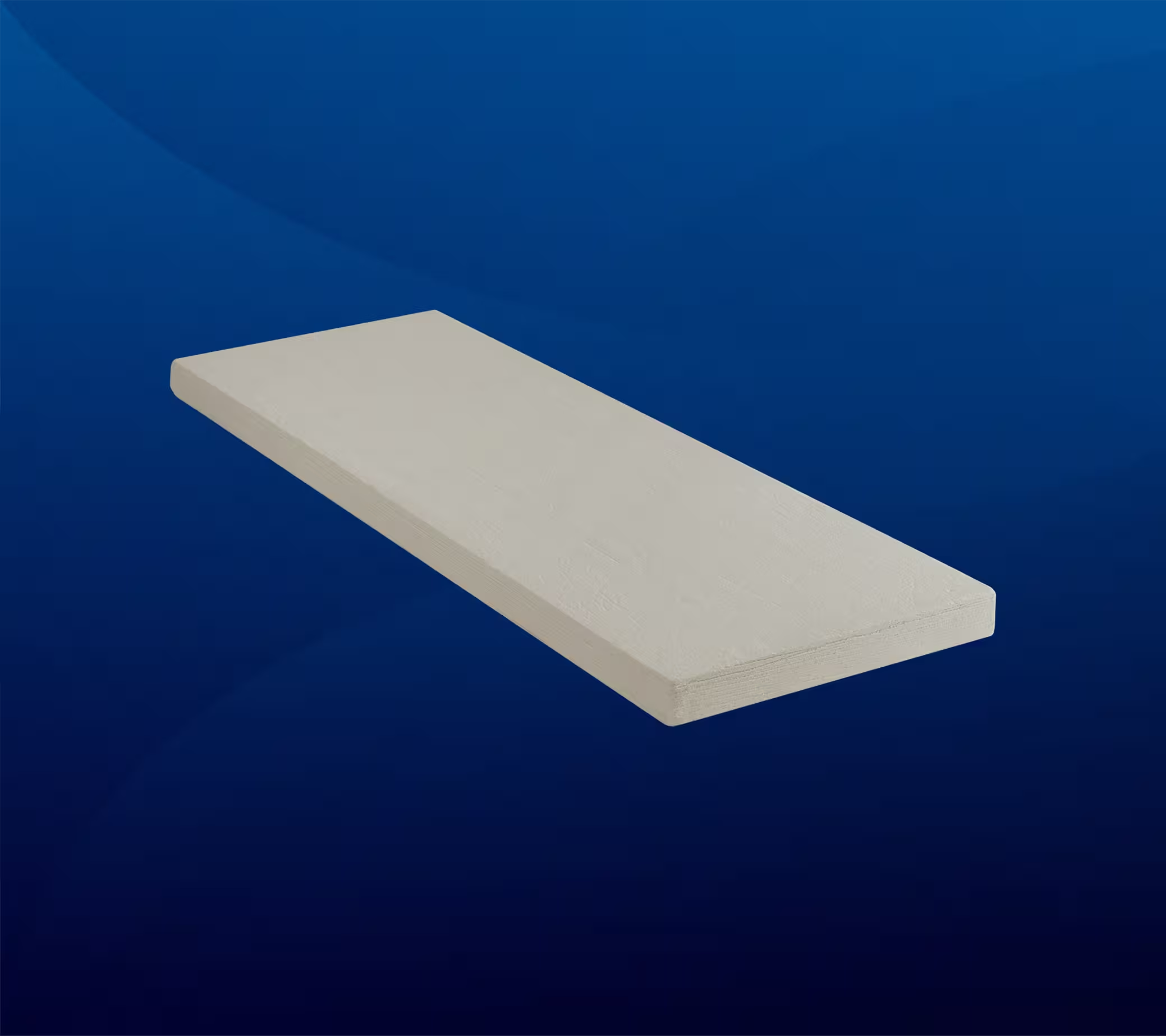MaxBoard LD 2300 insulating board is a low-density product manufactured to tight dimensional tolerances and an excellent surface finish.


A family of vacuum-formed boards designed to be strong, rigid, self-supporting, and resistant to high velocities, high vibrations, erosive forces, and mechanical stresses.
Our fiber boards are typically used for thermal management and with two fiber grades available, customization options are extensive. We offer standard formulations, sizes, and shapes typically found and required in the market.
Our range comprises of the following fiber grades Refractory Ceramic Fibers (RCF) and Low Biopersistent Fibers (LBP).


MaxBoard LD 2300 insulating board is a low-density product manufactured to tight dimensional tolerances and an excellent surface finish.
Maximum Use Temperature
2300°F (1260°C)
Composition
RCF (Refractory Ceramic Fiber)
Formulation
Organic
Density lb/ft³ (kg/m³)
16-20 (256-320)

MaxBoard ILD 2300 is an inorganic formulation so it can be used in applications where no off-gassing or related odors are acceptable, such as home appliances, lab furnaces and similar equipment.
Maximum Use Temperature
2300°F (1260°C)
Composition
RCF (Refractory Ceramic Fiber)
Formulation
Inorganic
Density lb/ft³ (kg/m³)
16-20 (256-320)

MaxBoard HD 2300 insulating boards are high-density products that offer the same tight dimensional tolerances and excellent surface finish as the MaxBoard LD product but provide increased compressive strength and modulus of rupture.
Maximum Use Temperature
2300°F (1260°C)
Composition
RCF (Refractory Ceramic Fiber)
Formulation
Organic
Density lb/ft³ (kg/m³)
26-30 (416-480)

MaxBoard HS 2400 was specifically designed for applications where there is a great amount of pressure/stress on the insulation lining.
Maximum Use Temperature
2400°F (1316°C)
Composition
RCF (Refractory Ceramic Fiber)
Formulation
Organic
Density lb/ft³ (kg/m³)
31-37 (497-593)

MaxBoard LD 2600 insulating board is a low-density product manufactured to tighter dimensional tolerances and excellent surface finish. Its temperature rating up to 2600°F makes it an excellent option for a vast range of applications where high-temperature resistance is required.
Maximum Use Temperature
2600°F (1427°C)
Composition
RCF (Refractory Ceramic Fiber)
Formulation
Organic
Density lb/ft³ (kg/m³)
16-20 (256-320)

MaxBoard HD 2600 insulating boards are high-density products that offer the same tight dimensional tolerances and excellent surface finish as the MaxBoard LD product but provide increased compressive strength and modulus of rupture.
Maximum Use Temperature
2600°F (1427°C)
Composition
RCF (Refractory Ceramic Fiber)
Formulation
Organic
Density lb/ft³ (kg/m³)
26-30 (416-480)

MaxBoard 2600 FP is a special chemical and abrasion-resistant insulation. Commonly used as baffle tiles in gas & wood stoves, combustion chambers, auxiliary combustion chambers and biomass applications where resistance to direct flame contact is required. MaxBoard 2600 FP can resist regular deformation that occurs with other standard alumina-silica based products.
Maximum Use Temperature
2600°F (1427°C)
Composition
RCF (Refractory Ceramic Fiber)
Formulation
Organic
Density lb/ft³ (kg/m³)
26-30 (416-480)

MaxBoard LD 3000 has the highest temperature rating of any NUTEC board product. Formulated from a blend of ceramic and mullite fibers that create an excellent high-temperature insulation board with low thermal shrinkage and excellent high-temperature stability.
Maximum Use Temperature
3000°F (1649°C)
Composition
RCF (Refractory Ceramic Fiber)
Formulation
Organic
Density lb/ft³ (kg/m³)
12-14 (192-224)

MG 1900 boards are a low-cost, high strength insulating board manufactured with the specific requirements of the refractory industry in mind.
Maximum Use Temperature
2012°F (1100°C)
Composition
High Temperature Fiber Mix
Density lb/ft³ (kg/m³)
16-20 (256-320)

SuperMag LD 1900 boards are manufactured from NUTEC's alkaline earth silicate wool (AESW) blended with specially selected inorganic and organic binders to provide rigid boards with exceptional characteristics.
Maximum Use Temperature
2200°F (1200°C)
Composition
LBP (Low Biopersistent Fiber)
Formulation
Organic
Density lb/ft³ (kg/m³)
16-20 (256-320)

SuperMag LD 1900 GI boards are high performance bio-soluble board manufactured from a wet slurry of fibers and binders.
Maximum Use Temperature
2200°F (1200°C)
Composition
LBP (Low Biopersistent Fiber)
Formulation
Organic
Density lb/ft³ (kg/m³)
19 - 23 (304-368)
© NUTEC Incorporated 2026